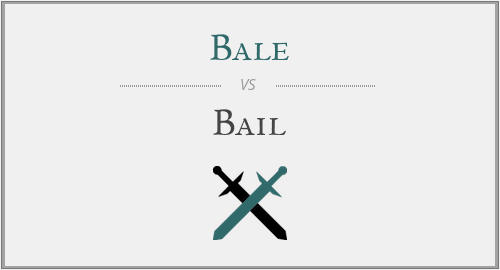Bale vs. Bail: Navigating Homophones in Language
Homophones, words that sound the same but have different meanings and spellings, can sometimes cause confusion. "Bale" and "bail" are examples of such homophones. This article aims to clarify the distinctions between "bale" and "bail," shedding light on their meanings, applications, and appropriate usage in various contexts.
Correct Usage:
Bale:
"Bale" is a noun referring to a large bundle or package of goods that has been tightly bound with twine, wire, or another material. It is commonly used in agriculture to refer to compressed and bound bundles of hay, straw, or similar materials.
Bail:
"Bail" can function as a noun or a verb. As a noun, it refers to the temporary release of an accused person awaiting trial, often involving a financial guarantee. As a verb, it means to release someone from custody, usually by posting bail.
Meanings and Applications:
Bale:
Use "bale" when referring to a tightly bound bundle of goods, typically in an agricultural or industrial context. It describes a compact and securely tied package of materials.
Bail:
Use "bail" when referring to the temporary release of a person from custody pending a trial, often involving the payment of a sum of money as a guarantee. As a verb, it means to release someone from custody using this process.

Examples:
Correct: The farmer loaded the bales of hay onto the truck for transportation.
Correct: The defendant's lawyer applied for bail to secure their release from jail before the trial.
Contextual Considerations:
Consider the context and subject matter when choosing between "bale" and "bail." If discussing bundled goods or agricultural products, "bale" is appropriate. If referring to legal matters and the release of a person from custody, "bail" is the correct term.
Conclusion:
Navigating the distinctions between "bale" and "bail" ensures precise communication and avoids confusion in both written and spoken language. Whether discussing agricultural practices or legal procedures, understanding the specific meanings of these homophones enhances clarity and accuracy in expression.




Have a discussion about this article with the community:
Report Comment
We're doing our best to make sure our content is useful, accurate and safe.
If by any chance you spot an inappropriate comment while navigating through our website please use this form to let us know, and we'll take care of it shortly.
Attachment
You need to be logged in to favorite.
Log In